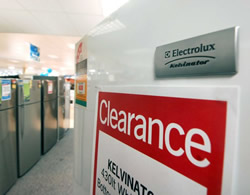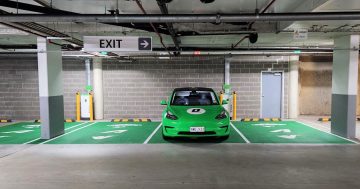Andy Kollmorgen* says research from CHOICE shows that one in five customers buy an extended warranty, despite existing warranty rights under consumer law.
 Need to know
Need to know
- Previous CHOICE investigations have revealed that salespeople often push extended warranties on customers whey they probably aren’t needed
- In our latest national survey, one in five Australians said they’d bought an extended warranty for extra protection
- The law says you’re entitled to choose a refund, repair or replacement from retailers for pricey items even if the manufacturer’s warranty has expired
In 2013 a team of CHOICE staffers set out to see how well the major electronics retailers were adhering to the Australian Consumer Law (ACL), which says stores must offer to replace, repair or refund your money in the case of a major fault with a product.
Retailers are obligated to do this for a reasonable amount of time following a purchase, depending on the value of the product.
So if a pricey TV goes on the blink less than two years after you bought it, for instance, the retailer would be required to offer to fix it, replace it, or give you your money back – and the choice of remedy would be yours.
And that holds true even if the manufacturer’s warranty has expired.
Retailers are not allowed to say you only have these rights if you bought an extended warranty, nor are they allowed to tell you to take it up with the manufacturer – their obligations to customers are enshrined in consumer law above and beyond anything else.
Salespeople flogging extended warranties
For our 2013 investigation, we mystery-shopped for a big-screen TV priced around $2500 at Harvey Norman, The Good Guys and JB Hi-Fi, purchasing goods from a total of 80 different stores across every state and territory in Australia.
We specifically asked salespeople if the store had any responsibility if the TV broke down after the manufacturer’s one-year warranty period.
The results were disappointing.
Under the ACL, the answer to the question we asked would be yes.
But 85 per cent of the salespeople we talked to got it wrong, saying any repairs or returns would be out of the store’s hands.
And every salesperson we spoke with also tried to sell us an extended warranty.
In 2015 we conducted a similar shadow shop of the same three retailers, and their understanding of their ACL obligations seemed to have improved – but not enough.
The overall failure rate was 48 per cent, and nearly all the salespeople still tried to sell us an extended warranty.
One in five still buying an extended warranty
While the ACL is clear on the subject, some of us still appear to be confused about whether we need an extended warranty or not.
Our latest Consumer Pulse survey reveals that about one in five Australians (18 per cent of respondents) have purchased extended warranties in the last two years, mostly for electronics and appliances.
The reason? People were buying “peace of mind” after they’d experienced previous product failures just outside of the included warranty.
A few survey-takers said they’d been urged by salespeople to buy an extended warranty.
And while six out of ten said they were aware of their ACL rights, the knowledgeable consumers purchased extended warranties as often as respondents who said they weren’t aware of their rights.
In a regulatory guide to electronics and whitegoods retailers, the ACCC says stores are not allowed to “tell a consumer that they must purchase an extended warranty when such a warranty does not provide them with any benefits above and beyond their consumer guarantees rights”.
Nor are they allowed to pressure customers into buying an extended warranty.
“You should make sure that the extended warranty provides value for money and benefits greater than what you automatically receive under the consumer guarantees,” the ACCC instructs retailers.
It’s also a requirement that salespeople explain the extra benefits any extended warranty will provide.
“Make sure that the extended warranty provides value for money and benefits greater than what you automatically receive under the consumer guarantees.” – ACCC
But retailer compliance is spotty at best. In 2017 the ACCC ordered the extended warranty providers Domestic & General Services and Yoogalu (owned by Harvey Norman) to update their brochures to include remedies available under the ACL and provide retail staff with compliance training.
“The ACCC has been concerned with the conduct of some retailers overstating the benefits of buying an extended warranty, when consumers have the free protection of consumer guarantees under the Australian Consumer Law,” ACCC commissioner Sarah Court said at the time.
*Andy Kollmorgen is a long-time investigative journalist who researches and reports on a wide range of issues in the consumer marketplace. He can be contacted on Twitter @andykollmorgen.
This article first appeared at choice.com.au





